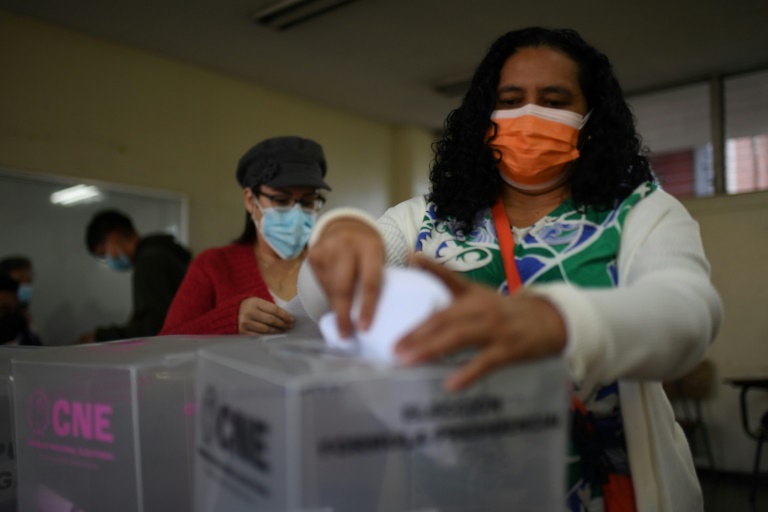Left-wing opposition candidate Xiomara Castro took a commanding lead over the ruling party’s Nasry Asfura in Honduras’ presidential election on Sunday, preliminary results showed.
With 40 percent of votes counted, former first lady Castro had taken almost 53.5 percent with the National Party’s Asfura a distant second out of 13 candidates with 34 percent, according to a National Electoral Council (CNE) live count.
Castro, whose husband Manuel Zelaya was deposed in a coup in 2009, is hoping to become the first female president of Honduras.
The news sparked scenes of celebration in the capital Tegucigalpa, with supporters setting off fireworks and honking their horns.
“Good night, we’ve won,” said Castro, addressing her supporters.
It was a far cry from the deadly protests that broke out four years ago when Juan Orlando Hernandez won a second successive term amid accusations of fraud. More than 30 people died as authorities cracked down on a month-long protest.
Reports of intimidation and violence in the buildup to this election led to fears the vote could spark fresh unrest.
Castro and Asfura both called for calm as they cast their votes, but the National Party (PN) leadership broke election rules by declaring victory less than an hour after polls opened, earning a rebuke from the European Union observer mission.
CNE president Kelvin Aguirre said “historic” numbers had voted, with a turnout of 62 percent of 5.2 million registered voters.
– ‘Not one drop of blood’ –
The opposition had expressed fears the poll could be rigged to keep the PN in power, which would almost inevitably prompt street protests.
Political analyst Raul Pineda, a former PN legislator, predicted a defeat for Castro, even a legitimate one, would trigger violence.
“We want this to be a civic event, in peace and tranquility,” said Castro as she voted.
“Peace and tranquility are priceless, and listen to me well: not one drop of blood is worth it,” added Asfura, the outgoing mayor of Tegucigalpa.
But residents of the capital were on tenterhooks.
“It’s worrying,” Luis Gomez, 26, told AFP from the gang-ridden Tegucigalpa neighborhood of La Sosa. “I live day to day (and) it would hurt us if there were disturbances.”
The country has been hit hard by gang violence, drug trafficking and hurricanes, with 59 percent of the 10 million people living in poverty.
Washington has been keeping a close eye on the election.
Honduras has been the starting point for a wave of migrant caravans trying to reach the United States.
Pineda said Washington had put pressure on Honduran authorities to ensure a free and transparent vote to avoid the trouble that broke out in 2017.
Some 18,000 police and as many soldiers are on duty nationwide.
Voting took place calmly in the capital.
“Regardless of who wins, we’re brothers, we’re all Hondurans and need to respect each other,” said Leonel Pena, 57, a carpenter in a poor neighborhood.
After almost a dozen years of PN rule, many voters said it was time for change.
“We’ve tried this government for 12 years and things have gone from bad to worse,” said Gomez. “We hope for something new.”
– ‘No narco-states, only narco-governments’ –
The PN has been in power since Zelaya was ousted in a 2009 coup supported by the military, business elites and the political right.
Corruption and drug-trafficking scandals have engulfed Hernandez and many in his inner circle.
“Honduras is internationally known as a narco-state. But there are no narco-states, only narco-governments,” said analyst Pineda.
Hernandez’s brother Tony is serving a life sentence in a US prison for drug trafficking.
Drug barons who the president helped extradite to the US have accused him of involvement in the illicit trade.
Asfura was accused in 2020 of embezzling $700,000 of public money, and the so-called Pandora Papers linked him to influence-peddling in Costa Rica.
The third major candidate in the presidential race, the Liberal Party’s Yani Rosenthal, spent three years in a US jail for money laundering.
He scored just nine percent in preliminary results.
“No more power will be abused in this country,” vowed Castro.
For many voters, the main issue was jobs.
“I want prosperity for us, employment, education,” said Elizabeth Romero, 75, a domestic worker from La Sosa.
Unemployment jumped from 5.7 percent in 2019 to 10.9 percent in 2020, largely because of the coronavirus pandemic, according to a study by the Autonomous University.
The country was also ravaged by two hurricanes in 2020.
As well as the president, Hondurans voted to elect the 28 members of the National Congress and 20 representatives of the Central American parliament.










